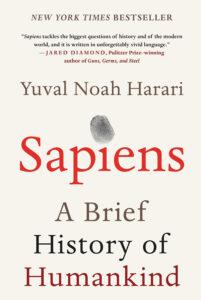Buy the book: Print | Ebook | Audiobook
Or, browse more book summaries
The Book in Three Sentences
- Human history has been shaped by three major revolutions: the Cognitive, Agricultural, and Scientific Revolutions.
- These revolutions have empowered humans to create and connect around ideas that do not physically exist.
- Shared “myths” such as religion, capitalism, and politics have enabled humans to dominate the world and overcome the forces of natural selection.
Book summary
“Sapiens: A Brief History of Humankind” is a non-fiction book written by Yuval Noah Harari, first published in 2011. The book covers the history of the human species, from the emergence of Homo sapiens in Africa to the present day, and explores the key events, developments, and trends that have shaped the course of human history.
Here are some of the main ideas and sub-headings covered in the book:
The Cognitive Revolution
- Homo sapiens’ unique ability to create and believe in shared myths and stories.
- The development of language and its role in enabling humans to cooperate and form larger social groups.
- The spread of humans out of Africa and their impact on other hominid species
The Agricultural Revolution
- The domestication of plants and animals and the shift from hunter-gatherer societies to settled agricultural communities.
- The rise of social hierarchies and the emergence of class divisions.
- The spread of disease and the impact of agriculture on human health and the environment.
The Unification of Humankind
- The rise of empires and the spread of religion, commerce, and ideas across cultures and continents.
- The impact of technology, particularly writing and the printing press, on human communication and knowledge-sharing.
- The development of nationalism and the challenges it poses to global cooperation and unity
The Scientific Revolution
- The emergence of the scientific method and its role in transforming human understanding of the natural world
- The impact of science on religion and the rise of secularism
- The growth of capitalism and the influence of science and technology on economic growth and prosperity
The Future of Humankind
- The potential impact of artificial intelligence, biotechnology, and other emerging technologies on the future of the human species
- The challenges posed by climate change and the need for global cooperation to address this and other existential threats
- The possibility of human beings transcending their biological limitations and achieving a post-human future.
Overall, “Sapiens” offers a thought-provoking and wide-ranging perspective on the human experience, highlighting both the remarkable achievements and the troubling consequences of our species’ evolution and development over time.
Important quotes
About Author of "Sapiens"
Yuval Noah Harari is an Israeli historian and author, born on February 24, 1976. He received his PhD in history from the University of Oxford, where he specialized in world history. Harari is a professor at the Hebrew University of Jerusalem and is best known for his books “Sapiens: A Brief History of Humankind,” “Homo Deus: A Brief History of Tomorrow,” and “21 Lessons for the 21st Century.” His work explores the history of human civilization, the impact of technology on society, and the future of humanity. Harari’s books have been translated into more than 50 languages and have sold millions of copies worldwide. He has received numerous awards and honors for his work, including the Society for Military History’s Moncado Prize for outstanding articles in military history and the Polonsky Prize for Creativity and Originality in the Humanistic Disciplines.
Buy the book: Print | Ebook | Audiobook
Or, browse more book summaries


